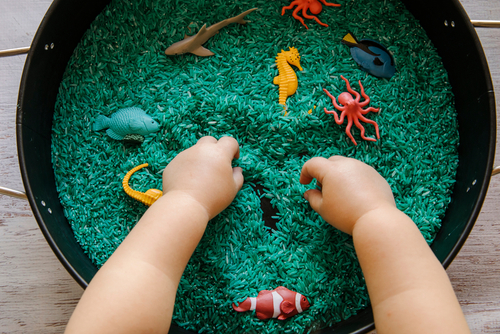The Benefits Of Sensory Play For Children

Sensory play expose children to new sensory information and help them develop their nerve connections that grow the architecture of their brains. These benefits are vital to their mental, emotional and behavioral development.
What Is Sensory Play?
Sensory play is an engaging and fun way to help children learn about their environment and the world around them. It involves using different senses – sight, touch, taste, smell and hearing – in order to explore, experience, and interact with the world around them. In a typical sense, sensory play looks like messy science experiments and toys that require a lot of attention from an adult. That is not to say that sensory play doesn’t involve a lot of hands-on work, but it’s important to remember that this activity is meant to be purely fun and interactive!
Motor Skills
Sensory activities such as squishing, pinching, pouring and smashing objects can help children develop their motor skills. These activities require kids to use their hands in very specific and deliberate ways, which strengthens their hand muscles. Fine motor skill development is also improved when children knead, roll, sort and shape play dough. These hands-on tasks encourage creative and independent play and don’t rely on peers or adults to guide the child’s play experience. Developing sensory skills can be calming for children who are upset, anxious or agitated. For example, playing with sand, using scented candles to create a peaceful scent scape (with supervision) and the sounds of water and bubbles can be soothing and promote mindfulness.
Cognitive Skills
Sensory play helps children develop cognitive skills like attention span, problem-solving, creativity and imagination. These skills are a necessary part of learning and development and can help children to grow in school and throughout their lives. Cognitive skill development can occur through a variety of sensory activities including visual, auditory and olfactory sensory play. Using these senses to explore the environment helps children learn about different colors, textures and shapes.
Language Skills
Sensory play for children develops language skills as they explore and understand the world through touch, taste, smell, sight and hearing. It also builds nerve connections in the brain that support speech and language, cognitive development, fine motor skills, problem solving and social interaction (Exploring the Benefits of Sensory Play, 2018). Talking about the objects and textures they are exploring during their sensory play will help them to describe what they are seeing and how it feels. This will encourage them to use descriptive words like “pot,” “sand,” or “water.”
Social Skills
Sensory play for children develops social skills by encouraging them to share, take turns, and cooperate with others. It also helps them to develop empathy and understanding of other people’s experiences. For example, if your child is reluctant to eat certain foods with a wet texture, you can engage them in sensory play activities that allow them to feel and explore these textures without feeling tempted to eat them. This can help build positive pathways in their brain to say these foods are safe for them to eat. This kind of activity can be particularly helpful for a child who is experiencing emotional difficulties. They can learn to set aside their feelings and become absorbed in the activity for a while, which can help them to calm down.







